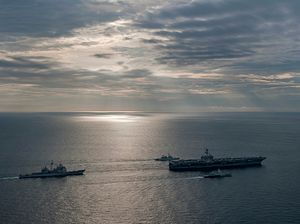Earlier this month, Malaysia’s newly-formed task force to combat illegal fishing conducted a pre-planned, high-profile operation that led to the detention of several vessels. The move spotlighted the new task force’s role as part of Malaysia’s ongoing response to tackle a longstanding issue despite the challenges that remain ahead.
As I have noted before in these pages, illegal fishing has long been a problem for Malaysia as it has been for a few other Southeast Asian countries as well, with previous government estimates having indicated that the country loses about 6 billion ringgit ($1.43 billion) annually in this respect, mostly from fishing vessels coming from Thailand and Vietnam, but also at times with local involvement as well. In response, various Malaysian agencies have been taking steps to address the problem, including being stricter in prosecuting guilty foreign fishermen to even sinking ships.
These practices have continued on under the new Pakatan Harapan (PH) government, which came to power following a shock election victory in May 2018. Indeed, illegal fishing has factored into the government’s commitment to preserve Malaysia’s sovereignty and territorial integrity that was articulated in its election manifesto and is finding its way into forthcoming foreign policy and defense documents as well, including the expected release of the country’s first-ever defense white paper.
One of the manifestations of Malaysia’s response to tackle IUU fishing has been the operationalization of a multi-agency special task force to address the issue. While the proposal has been long mulled and its initial establishment had been seen last year, its operationalization was only expected to occur following the finalization of specifics and mechanisms. Last month, in a sign of progress, Malaysian officials announced that following cabinet approval, the home ministry would take the lead on the task force with the help of a range of other agencies, including the Malaysian Maritime Enforcement Agency, the Immigration Department, and the Foreign Ministry.
Over the past few weeks, Malaysia’s illegal fishing task force has been in the headlines with respect to an ongoing operation designed to combat this challenge. Per Malaysia’s home ministry, the task force embarked on an operation called Ops Naga, which covered Malaysian waters and airspace in Pahang, Terengganu, and Kelantan, and took place between May 2 and May 16. While not much in the way of further details were publicly disclosed, it cited that 266 vessels were checked and 25 Vietnamese fishing vessels and 123 crew members were detained.
The ongoing operation comes as no surprise: Malaysian officials had indicated that operations would follow the establishment of the task force, and there has also been an increasing focus on the issue of illegal fishing over the past month or so given what has been characterized as a surge of encroachments by Vietnamese fishermen, leading Malaysia to take a series of measures including issuing an official protest note to Hanoi. Nonetheless, this is not without significance within the context of Malaysia’s ongoing approach to the IUU fishing challenge: it signals the country’s intent to undertake a tougher approach in a more coordinated way.
To be sure, this represents just one among several developments in addressing a longstanding problem. The issue of illegal fishing and its manifestations are rooted in several issues that extend beyond Malaysia, including trends such as resource depletion that are affecting fishing in Southeast Asia more generally, as well as seasonal developments that see ebbs and flows in activities. And with respect to Malaysia’s own response, there are significant challenges to overcome as well, including the country’s own capacity constraints that limit its ability to fully and effectively policy its own waters, as well as coordination issues between different agencies that can reduce the effectiveness of enforcement measures.
Nonetheless, given the significance that the Malaysian government has placed on addressing this issue as well as the actions recently taken by the new task force, these developments will continue to be worth monitoring to give a sense of just how well the Southeast Asian state is managing this challenge on its own as well as with other countries and institutions.
































